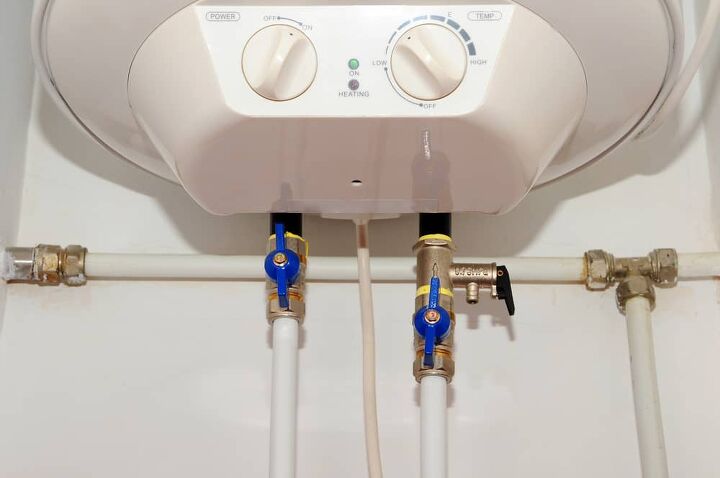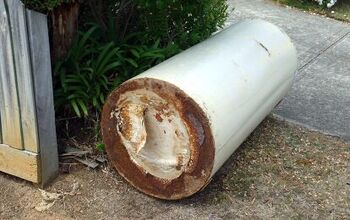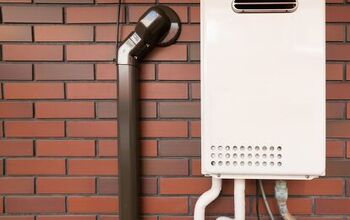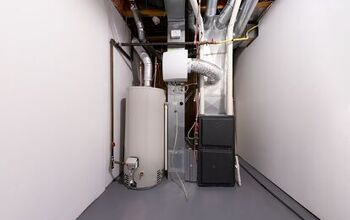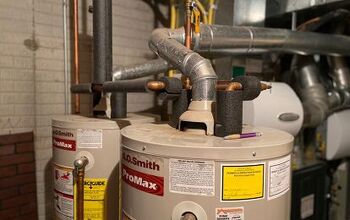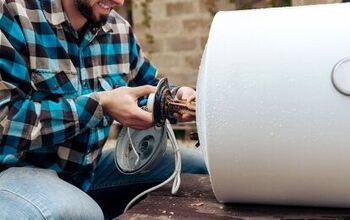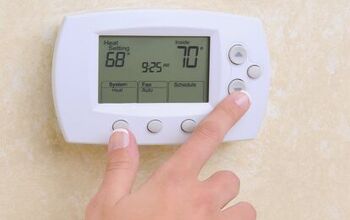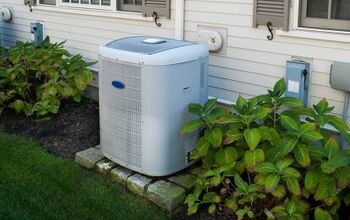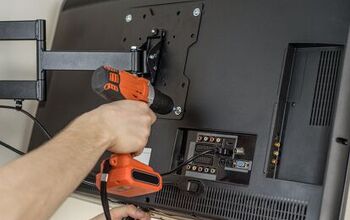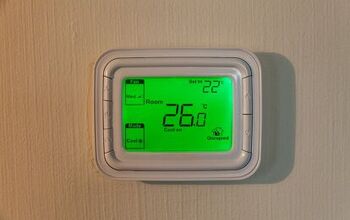Can An Electric Water Heater Sit On The Floor? (Find Out Now!)

An appliance that gets installed into your home that is easily forgotten about and probably taken for granted is the hot water tank. When you are third or fourth in line for a shower in your home and run out of hot water, you will be thinking about it then! This appliance is generally found in your basement or garage and is responsible for supplying hot water to your house for bathing, cooking, or cleaning.
When installing your water heater, there are some code requirements that need to be followed. These codes could be universal, like having proper venting and a dedicated water shutoff valve. However, some of these codes, like earthquake straps, will depend on where you live. Some codes apply depending on the type of water heater you install.
An electric water heater can sit on the ground with no problems, however, you want to ensure that it is not sitting in any dirt or dust. Also, ensure that your floor is level. Check with your local code enforcement though, as some will require you to elevate your water after.
Therefore, we’ll discuss some ideal places you can install your water heater to forgo any possible issues down the line.
Where To Install Your Water Heater
Generally, regulations require the water heater to be placed on an outside wall. This is to accommodate the flue, which is why most water heaters are found in the basement or the garage.
To maximize the most efficient energy from your water tank, take careful consideration of placing it as close to your kitchen and bathrooms. Doing this means the water heater does not have to pump the water as hard to get the water to you.
Make Sure The Surface Is Level
Your water heater needs to maintain a level sitting surface. This is one reason why an elevation table is helpful; however, if the floor is not level, you will need to shim the base of the water heater. This will enable the water or the gas, if warranted, to flow correctly without fail.
It is also crucial to locate your water heater near a drain for any water leaks. If a drain is not accessible, you could use a drain pan instead to collect the water.
What If You Have A Tankless Water Heater?
If you have chosen a more modern route of a tankless water heater, you have more options. Since the tankless water heater is mounted on the wall, you could even install this within the bathroom or kitchen itself.
Regardless of which type of water heater you have, you will want to ensure it is near an electrical outlet and have adequately insulated piping to eliminate electrical shortage and possible fires.
Reasons To Elevate Your Water Heater
While it’s okay to leave your electric water heaters on the ground, here are some reasons why you should choose to elevate them instead.
Fire Prevention
The primary reason to elevate your water heater is to prevent a fire. When the water heater is placed on the floor, especially with gas water heaters, there is a risk of combustible fluid dripping to your floor. This can create an unsafe environment that can cause an explosion. Some newer models are created to have resistance to flammable vapor.
These water heaters are listed as “FVIR” or Flammable Vapor Ignition Resistant and can essentially be placed anywhere. FVIR water heaters have a sealed combustion chamber which makes them safer.
However, due to the risks of older styles, homeowners are still more likely to elevate their water heater to minimize risk. In addition, local municipalities may require it to be still elevated.
The Lifespan Of The Water Heater
To ensure the longest lifespan of your water heater, elevating it off the ground will help you with that. This is especially true if the floor is concrete, making the base of the water heater corrode. Additionally, if there are incidents in the location, such as flooding, having it elevated will help keep it in pristine condition.
Code Enforcement
Always check with your local municipality before installing your water heater. Some types of water heaters require gas hookups and will require permits and possibly a secondary permit.
Also, if you live in a location with weather implications, like earthquakes, your local municipality could require additional codes to be met that are different from other locations.
Generally, your water heater should be at least 18 inches from the floor. You can do this simply with bricks, or you can purchase an actual water heater stand. Regardless of what you choose to elevate it, any ignition source needs to clear the 18 inches from the floor to ensure a safe and secure environment.
What To Consider When Shopping For A Water Heater?
Having to replace your water heater can be stressful enough; however, when there are many options to consider, you can feel even more overwhelmed.
Do a lot of research on the type of water heater you want, the fuel source you plan on using, and the cost of these options. The most important things to consider are:
- What is the future demand for water needed in your home?
- Do you plan on staying in the home? And for how long?
- How large is your household? And how much water will you use?
Types Of Water Heaters
Before you go and purchase a water heater, you should minute to familiarize yourself with several different types first. This will make shopping a lot easier.
Conventional Water Heater
A conventional water heater is the most common water heater found in homes. They are either gas or electric-powered and have a tank that stores the warm water ready to be used.
They require bi-annual cleanings to remove mineral scales and any sediments. The downfall is usually that they need to be elevated from the floor, depending on the fuel source, and once the tank is empty, all the hot water is gone.
Solar Powered Water Heater
This style of water heater uses modern technology of using the sun as an energy source to heat the water. This is an excellent option for those that have already transitioned to solar energy.
This style does have a tank, so it will require some maintenance. However, without a fuel source being used, it can rest on the ground, but these tanks are costly.
Tankless Water Heater
A tankless water heater does not have a tank that stores the warm water. Instead, it is equipped with coils that heat the water on-demand as you need it. It still will require some maintenance but only once a year to avoid corrosion. These tankless systems are very small and can even be mounted on a wall.
Our Takeaway
While it is okay to set an electric water heater on the ground, it’s actually better to elevate it so that you don’t run the risk of any fires, or going against code. Remember that in earthquake-prone areas, your water heater should have straps and it’s easier if the tank is affixed to the wall.
By ensuring that your water heater is installed properly, you decrease the likelihood of anything going wrong, and you decrease the chances of your water heater going out quicker than it should. As long as you follow the instructions of your local authorities as well as the manufacturing instruction, you can ensure your water heater lasts you for many years to come.
Related Questions
Do electric water Heahrs need elevated?
Short answer, no. According to the Uniform Plumbing Code, which establishes a nationwide code, only requires water heaters that use a fuel source, like gas, to be elevated. However, depending on your local municipality code, you may still be required to elevate it.
What size water heater should I get?
Some homes may require more than one water heater, depending on the size of your home or how much water is being used daily. The following is a simple guide to determine what size you will need:
- Family size 1 to 2 – 30-gallon tank
- Family size 2 to 3 – 40-gallon tank
- Family size 3 to 4 – 40 to 50-gallon tank
- Family size 5 or more – 50 to 80-gallon tank
Tankless water heaters may seem appealing with how much space they save in addition to the on-demand hot water results. They ultimately will save about 20 to 40 percent on energy than the contemporary water tank. With proper maintenance, they can last twice as long as the water heaters with a tank, having a life expectancy of eight to twelve years.

Heather is a passionate writer who loves anything DIY. Growing up, she learned everything from home repairs to design, and wants to share her tips with you. When she's not writing, she's usually hiking or searching for her next DIY project.
More by Heather Robbins



